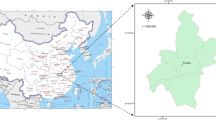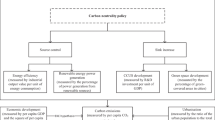Abstract
National key towns are one of the most important units for mitigating China’s carbon emissions from urbanisation, industrialisation and agricultural modernisation under China’s rural revitalisation strategy. The rise in the carbon footprint (CF) corresponding to increasing populations and energy consumption in national key towns has not been underestimated. This paper aims to explore the impact of local resident energy consumption on the degree of coordination between ecology and the economy. To achieve this objective, the carbon pressure index (CPI), carbon occupancy index (COI) and eco-economic coordination index (EECI) are constructed by applying the CF, carbon carrying capacity (CC) and carbon deficit (CD) of Caijiapo Town from 2012 to 2017. Furthermore, the relationship between the CF, economic growth and per capita disposable income is described based on the decoupling index (DI). The results reveal that, apart from a decline in 2014, the per capita CF of Caijiapo Town has increased, with an average annual growth rate of 16.80%. The CF of different energy sources shows that the CF of natural gas is much larger than those of raw coal, oil and electricity. The DI between GDP, the per capita disposable income of urban and rural residents and the resident energy CF first decreases and then increases. The DI between GDP, the per capita disposable income of urban residents and the resident energy CF is 1.09 and 1.72, and urban residents are the main contributors to the resident energy CF from 2015 to 2017. The CPI and COI show an upward trend, and the eco-economic coordination index (EECI) of Caijiapo Town undergoes a change from poor coordination (grade II) to worst coordination (grade I) from 2012 to 2017. Therefore, the following suggestions are proposed: the CC should be treated as a constraint, energy utilisation should be improved, residents’ consumption structure should be optimised, differentiated policies should be implemented for the energy consumption of urban and rural residents and a spatial planning system and operational mechanism should be established that combines multiple regulations into a single regulation.




Similar content being viewed by others
References
Adnan MN, Safeer R, Rashid A (2018) Consumption based approach of carbon footprint analysis in urban slum and non-slum areas of Rawalpindi. Habitat Int 73:16–24
Ahmad S, Baiocchi G, Creutzig F (2015) CO2 emissions from direct energy use of urban households in India. Environ Sci Technol 49(19):11312–11320. https://doi.org/10.1021/es505814g
China Business Council for Sustainable Development (2014) Chinese guidelines for the preparation of provincial greenhouse gas inventories. http://www.cbcsd.org.cn/sjk/nengyuan/standard/home/20140113/download/shengjiwenshiqiti.pdf
Dai QH, Liu GB, Liu MY, Wang YB (2005) An evaluation on sustainable development of eco-economic system in small watershed in hilly area of Northeast China. Acta Geograph Sin 60(2):209–218
Druckman A, Jackson T (2009) The carbon footprint of UK households 1990–2004: a socio-economically disaggregated, quasi-multi-regional input–output model. Ecol Econ 68:2066–2077. https://doi.org/10.1016/j.ecolecon.2009.01.013
Fan JL, Liu J, Zhang X (2015) Urbanization effect on regional household energy consumption in China. China Population, Resources and Environment 25(1):55–60. https://doi.org/10.3969/j.issn.1002-2104.2015.01.008
Fan Z, Lei Y, Wu S (2019) Research on the changing trend of the carbon footprint of residents’ consumption in Beijing. Environ Sci Pollut Res 26:4078–4090. https://doi.org/10.1007/s11356-018-3931-9
Fang K, Shen WB (2010) Construction and application of calculation model for CO2 emission carrying capacity. Ecol Sci 29:558–562. https://doi.org/10.3969/j.issn.1008-8873.2010.06.011
Fang K, Dong DM, Shen WB (2010a) Modified energy ecological footprint method and its application to analysis and evaluation of regional energy utilization benefit. Sci Geogr Sin 30:686–692. https://doi.org/10.13249/j.cnki.sgs.2010.05.017
Fang K, Shen WB, Wang LL (2010b) Sustainability analysis in agricultural area based on modified energy ecological footprint model. Geogr Geo-Inf Sci 26:66–69
Feng KS, Hubacek K, Sun LX, Liu Z (2014) Consumption-based CO2 accounting of China’s megacities: the case of Beijing, Tianjin, Shanghai and Chongqing. Ecol Indic 47:26–31. https://doi.org/10.1016/j.ecolind.2014.04.045
Guo Y, Cheng XJ, Zhu F, Jiang RH (2010) Studies on ecological security dynamics based on ecological footprint in Jiangsu province. Resour Environ Yangtze Basin 19:1327–1332
Han ZY, Meng YL, Liu LP, Liu NL, Zhou ZG (2012) Modified method of energy carbon footprint and application based on regional land use change. Trans Chin Soc Agric Eng 28:190–195
Hertwich EG, Peters GP (2009) Carbon footprint of nations: a global, trade-linked analysis. Environ Sci Technol 43:6414–6420. https://doi.org/10.1021/es803496a
Intergovernmental Panel on Climate Change (2006) 2006 IPCC Guidelines for National Greenhouse Gas Inventories. http://www.ipcc-nggip.iges.or.jp/public/2006gl/chinese/index.html
Isman M, Archambault M, Konga CN et al (2018) Ecological footprint assessment for targeting climate change mitigation in cities: a case study of 15 Canadian cities according to census metropolitan areas (CMA). J Clean Prod 174:1032–1043. https://doi.org/10.1016/j.jclepro.2017.10.189
Kim T, Kim H (2013) Analysis of the effects of intra-urban spatial structures on carbon footprint of residents in Seoul, Korea. Habitat International 38:192–198. https://doi.org/10.1016/j.habitatint.2012.06.006
Kitzes J, Wackernagel M (2009) Answers to common questions in ecological footprint accounting. Ecol Indic 9:812–817. https://doi.org/10.1016/j.ecolind.2008.09.014
Laurent A, Olsen SI, Hauschild MZ (2012) Limitations of carbon footprint as indicator of environmental sustainability. Environ Sci Technol 46:4100–4108. https://doi.org/10.1021/es204163f
Li HT, Liao YC, Yan MC et al (2003) Energy evaluation and assessment of sustainability on the eco-economic system of Xinjiang. Acta Geograph Sin 58(5):765–772
Li JL, Lin BQ (2019) The sustainability of remarkable growth in emerging economies. Resources Conservation and Recycling 145:349–358. https://doi.org/10.1016/j.resconrec.2019.01.036
Li JL, Liu HX, Du KR (2019) Does market-oriented reform increase energy rebound effect? Evidence from China’s regional development. China Economic Review 56:101304. https://doi.org/10.1016/j.chieco.2019.101304
Liang S, Liu Z, Crawford Brown D et al (2014) Decoupling analysis and socioeconomic drivers of environmental pressure in China. Environ Sci Technol 48:1103–1113
Liu Y, Liu D, Zhang LX (2016) Study on carbon footprint of the urban household consumption in China based on the differences of income and consumptions. Ecol Sci 35:194–199. https://doi.org/10.14108/j.cnki.1008-8873.2016.01.030
Lu JY, Huang XJ, Chen Y, Xiao X (2013) Spatiotemporal changes of carbon footprint based on energy consumption in China. Geogr Res 32:326–336
Ma G, Ren ZY, Han HZ (2014) Ecological footprint calculation of Shaanxi province based on net primary productivity. J Shaanxi norm Univ Nat Sci Ed 42:84–89. https://doi.org/10.15983/j.cnki.jsnu.2014.05.041
Núñez D, Nahuelhual L, Oyarzún C (2006) Forests and water: the value of native temperate forests in supplying water for human consumption. Ecol Econ 58:606–616. https://doi.org/10.1016/j.ecolecon.2005.08.010
Ottelin J, Heinonen J, Junnila S (2018) Carbon footprint trends of metropolitan residents in Finland: how strong mitigation policies affect different urban zones. J Clean Prod 170:1523–1535. https://doi.org/10.1016/j.jclepro.2017.09.204
Peng WF, Zhou JM, Xu XL et al (2016) Effect of land use changes on the temporal and spatial patterns of carbon emissions and carbon footprints in the Sichuan Province of Western China, from 1990 to 2010. Acta Ecol Sin 36:7244–7259. https://doi.org/10.5846/stxb201506111188
Shaanxi Daily (2015) Cultivation of small cities, a town to city practice . http://esb.sxdaily.com.cn/sxrb/20151029/html/page_08_content_000.htm
Solarin SA (2019) Convergence in CO2 emissions, carbon footprint and ecological footprint: evidence from OECD countries. Environ Sci Pollut Res 26:6167–6181. https://doi.org/10.1007/s11356-018-3993-8
Song W (2014) Decoupling cultivated land loss by construction occupation from economic growth in Beijing. Habitat Int 43:198–205. https://doi.org/10.1016/j.habitatint.2014.03.002
Sun Q (2017) Research on the influencing factors of reverse logistics carbon footprint under sustainable development. Environ Sci Pollut Res 24:22790–22798. https://doi.org/10.1007/s11356-016-8140-9
Sun CW, Ding D, Fang XM, et al (2019) How do fossil energy prices affect the stock prices of new energy companies? Evidence from Divisia energy price index in China’s market. Energy 169:637–645. https://doi.org/10.1016/j.energy.2018.12.032
Tosti L, van Zomeren A, Pels JR, Comans RNJ (2018) Technical and environmental performance of lower carbon footprint cement mortars containing biomass fly ash as a secondary cementitious material. Resour Conserv Recycl 134:25–33. https://doi.org/10.1016/j.resconrec.2018.03.004
Wang CM (2010) Decoupling analysis of China economic growth and energy consumption. China Popul Environ 20:35–37
Wang Z, Fang C, Cheng S, Wang J (2013) Evolution of coordination degree of eco-economic system and early-warning in the Yangtze River Delta. J Geogr Sci 23:147–162. https://doi.org/10.1007/s11442-013-1000-3
Wang W, Li M, Zhang M (2017) Study on the changes of the decoupling indicator between energy-related CO2 emission and GDP in China. Energy 128:11–18. https://doi.org/10.1016/j.energy.2017.04.004
Wang YN, Xie YQ, Xie LQ, Chen W (2019) Factor decomposition of Chinese urban household carbon emissions-empirical analysis based on LMDI model and Q-clustering. Res Environ Sci 32:539–546. https://doi.org/10.13198/j.issn.1001-6929.2018.11.19
Wei LH, Lin N, Ju MT (2017) Carbon safety assessment based on carbon footprint and carbon capacity in Xinjiang Uygur autonomous region. Bull soil water Conserv 37:281-285,291. https://doi.org/10.13961/j.cnki.stbctb.2017.01.049
Wei W, Shi PJ, Wei XX et al (2018) Evaluation of the coordinated development of economy and eco-environmental systems and spatial evolution in China. Acta Ecol Sin 38(8):2636–2648. https://doi.org/10.5846/stxb201705020796
Wiedenhofer D, Guan D, Liu Z et al (2017) Unequal household carbon footprints in China. Nat Clim Chang 7:75-+. https://doi.org/10.1038/NCLIMATE3165
Wiedmann T, Minx J (2008) A definition of carbon footprint. Ecol Econ Res Trends 2:55–65
World Wild Fund For Nature (2016) 2016 Living Planet Report.. http://www.footprintnetwork.org/living-planet-report/
Wu YZ, Chen YX, Deng XY, Hui ECM (2018) Development of characteristic towns in China. Habitat Int 77:21–31. https://doi.org/10.1016/j.habitatint.2017.12.008
Wu Y, Tam VWY, Shuai C, Shen L, Zhang Y, Liao S (2019) Decoupling China’s economic growth from carbon emissions: empirical studies from 30 Chinese provinces (2001–2015). Sci Total Environ 656:576–588. https://doi.org/10.1016/j.scitotenv.2018.11.384
Yan X, Cheng CC, Jia YZ (2018) Effect decomposition of industry, space and population on energy consumption during Chinese urbanization. Resour Sci 40:216–225. Doi: https://doi.org/10.18402/resci.2018.01.20
Yang Y, Meng GF (2019) The decoupling effect and driving factors of carbon footprint in megacities: the case study of Xi’an in western China. Sustain Cities Soc 44:783–792. https://doi.org/10.1016/j.scs.2018.11.012
Yang Y, Liang LB, Zhang JQ (2017) Evolution trend and fairness evaluation of ecological footprint in Guanzhong city group. J Nat Resour 32:1360–1373. Doi: https://doi.org/10.11849/zrzyxb.20160772
Zhao XG, Xiao L, Ma CH, Wei LH, Gao LF (2006) Design of sustainability indicators system based on ecological footprint. Sci Agric Sin 39:1202–1207
Zhao RQ, Huang XJ, Zhong TY (2010) Research on carbon emission intensity and carbon footprint of different industrial spaces in China. Acta Geograph Sin 65:1048–1057
Zhao DT, Guo T, Fan J (2012) The measurement and evolution of embedded carbon footprint in Chinese urban inhabitants. Syst Eng 30:24–32
Zhong MC, Zhang XG (2010) Summary about the critique of environmental Kuznets curve. China Popul Environ 20:62–67
Funding
This work was supported by the National Social Science Foundation of China Western Project (15XJL009); Soft Science Research Programme of Shaanxi-Joint Project (2018KRLY07).
Author information
Authors and Affiliations
Corresponding author
Ethics declarations
Conflict of interest
The authors declare that they have no conflict of interest.
Additional information
Responsible Editor: Philippe Garrigues
Publisher’s note
Springer Nature remains neutral with regard to jurisdictional claims in published maps and institutional affiliations.
The highlights of this study are reflected in the following five aspects:
1.CF based on NPP was used to analyse resident energy in town scale.
2.A framework for analysing eco-economic coordination was established.
3.The decoupling effect in Caijiapo Town was interpreted based on the CF model.
4.The EECI of Caijiapo Town was found to have changed from Grade II to Grade I.
5.The decoupling index of Caijiapo Town was found to first decrease and then increase.
Electronic supplementary material
ESM 1
(DOCX 36 kb)
Rights and permissions
About this article
Cite this article
Yang, Y., Meng, G. Analysis of the decoupling effect and eco-economic coordination of the resident energy carbon footprint: a case study of Caijiapo Town, a national key town in western China. Environ Sci Pollut Res 27, 6936–6949 (2020). https://doi.org/10.1007/s11356-019-07350-w
Received:
Accepted:
Published:
Issue Date:
DOI: https://doi.org/10.1007/s11356-019-07350-w




